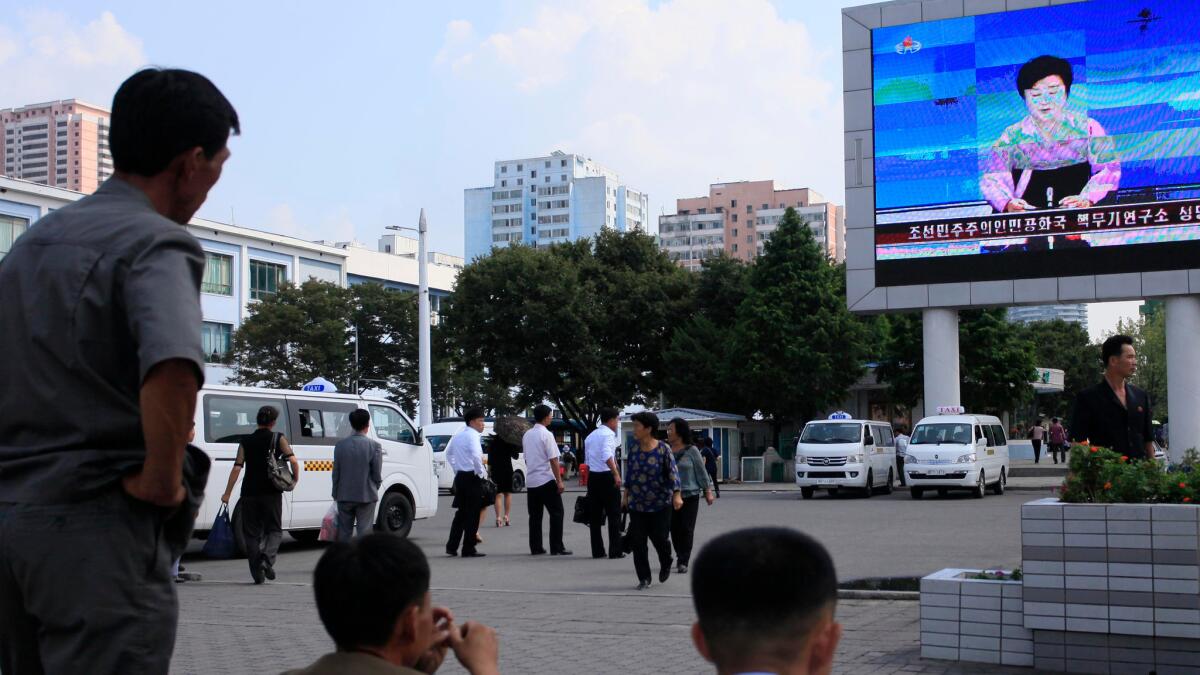Editorial: The world is in turmoil, but we obsess over a case of pneumonia

- Share via
Back in February, a Gallup poll found American voters from across the political spectrum agreeing on four key issues facing the nation as it headed into the heart of the 2016 presidential election. What weighed so heavily on their minds? Terrorism and national security; the economy; employment and jobs; and healthcare and the Affordable Care Act. Their interests haven’t changed much since then; in August, the economy was the top concern. So what did the campaign — and campaign coverage — focus on over the last few days? Whether Hillary Clinton’s contracting pneumonia somehow makes her less viable as a president, and whether her lumping half of Trump’s supporters into a “basket of deplorables” makes her less electable.
The focus on such minor events and controversies doesn’t really come as a surprise; it’s been the hallmark of this prolonged campaign season. Nevertheless, it’s dumbfounding to realize that North Korea’s successful test of a nuclear bomb last week was a come-and-go moment in the campaign. Also mostly ignored: that the civil war in Syria, which has caused one of the worst humanitarian tragedies in modern human history and has unsettled the political stability of Europe, may be entering into a truce (or not, given the five-year history of the war and related crises). Meanwhile, President Obama and Chinese President Xi Jinping recently signed off on the 2015 Paris accord to try to limit the increase in global warming to 1.5 degrees Celsius, yet climate change barely registers as a political issue.
This, of course, is at least as much a failure of journalism — particularly the round-robins of political surrogates on cable news shows — as it is about the campaigns themselves. Journalists tend to set the pace of the discussion by what they report on and thus magnify. Trump has provided a rich and deep vein to tap, but it is important to not let his sensational comments, or a treatable illness contracted by Clinton, push truly important subjects off the agenda.
The larger issues matter. Clinton has tried to focus on some of them. On Friday she decried the North Korean nuclear test as “outrageous and unacceptable.” It “constitutes a direct threat to the United States,” she added, “and we cannot and will never accept this.” But she was short on details of what to do other than press for negotiations and a stronger response from China, and to equip allies in the region with missile defense systems — a step that China has said it will not abide.
For Trump’s part, a spokesman for his campaign blamed Clinton for the world’s inability to bring North Korea to heel. “Clinton promised to work to end North Korea’s nuclear program as secretary of State, yet the program has only grown in strength and sophistication.” But the campaign was silent on what he would do to address it. (Trump previously has said he would consider allowing Japan and South Korea to develop their own nuclear arsenals — an escalation that would further destabilize a volatile situation and strengthen China’s support for the rogue state.)
Yet there has been little sober public analysis of where the candidates stand, and where their policy positions would bring the world. This has been the arc of the campaign — thrashing about over relative trivialities. That’s not to say that the health of top presidential candidates isn’t serious, and the candidates’ ages — Clinton would be the second oldest president in history, Trump would be the oldest — deserve consideration. So yes, both candidates should release detailed medical records.
But the nation should be spending more time seriously challenging and dissecting the candidates’ grasp of the world, and their solutions to its problems. Trump doesn’t believe that human activity has played a role in global warming, despite overwhelming agreement among scientists. He has advocated war crimes, from the killing of terrorists’ families to torture, and plundering Iraqi oil at the end of the war as he suggested would have violated the Geneva Conventions. His immigration policies would throttle back one of the main pipelines that historically has made the nation an economic powerhouse.
The world, and the nation, are far from the dystopia that Trump peddles in his campaign appearances. Nevertheless, we face significant issues that require serious investigation and discussion, from geopolitics to the depressingly strained state of relations between police and African American communities, and from crumbling infrastructure to the somnambulant economy and the income divide that has propelled some of the deep dissatisfaction that expressed itself in the rise of both Trump and Bernie Sanders. Treating Clinton’s pneumonia is easy. The rest is hard.
Follow the Opinion section on Twitter @latimesopinion and Facebook
More to Read
A cure for the common opinion
Get thought-provoking perspectives with our weekly newsletter.
You may occasionally receive promotional content from the Los Angeles Times.










